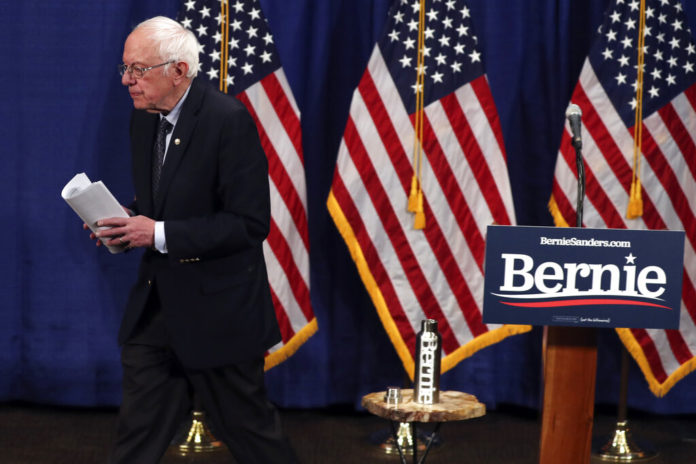
Bernie Sanders pledged to harness the energy from his first campaign to turn out more voters in 2020. He would build a coalition of black, young and working-class voters who were energized by his transformative vision for America to build a broad coalition that would make him an unstoppable force against Democratic rivals and President Donald Trump.
He was wrong.
Virtually every expectation that the Vermont senator carried into his second White House bid has been overturned by Joe Biden‘s dramatic comeback. The former vice president has emerged as the candidate preferred by African Americans from South Carolina to Mississippi and Michigan. Biden has also won voters without college degrees and made striking inroads in the suburbs that could be critical to control of the White House in November.
“Last night, obviously, was not a good night for our campaign, from a delegate point of view,” Sanders said Wednesday in his first public comments since he lost Michigan, the state that solidified his insurgent campaign four years ago.
Sanders isn’t going anywhere immediately. He will be in Arizona on Sunday for a one-on-one debate against Biden. Arizona, which votes next Tuesday, is one of the few remaining bright spots on the primary calendar for Sanders. Having demonstrated new strength with Latinos this year, he hopes similar support in Arizona could at least momentarily blunt Biden.
But the hurdles are getting higher. Sanders needs to win 57% of the remaining delegates to wrest the nomination from Biden. Both the rules for allocating delegates and voting history suggest that will be difficult.
Sanders’ challenge is demonstrated in part by his support among young voters. In Michigan, the largest of six states that voted last Tuesday, about 70% of voters under 30 backed Sanders. But they accounted for only 14% of voters, according to AP VoteCast, a survey of the state’s electorate.
Veteran Democratic strategist James Carville criticized Sanders’ flawed belief that he could fundamentally change the electorate by relying on the young.
“There was no chance,” Carville said. “Any political scientist with an IQ above room temperature could have told you that.”
If one of Sanders’ strongest constituencies doesn’t turn out in large numbers, it may do him little good.
However long Sanders remains in the race, Biden’s resurgence laid bare that, at his core, the senator is in some ways more of a cause than a candidate. And movement politics rarely lead to winning national elections.
Sanders’ team also appears to have underappreciated the shift in the nation’s suburbs away from Trump and toward centrist Democrats who were vital in sweeping the party back into control of the House in 2018.
Sanders’ embrace of democratic socialism is particularly scary to such educated moderates, who, above all, are looking for the most “electable” candidate to take on Trump this fall.
“Bernie is Captain 35%. That’s the magic number of the ultra-liberal, ultra-progressives that are standing with him bar none,” said Democratic pollster Jeff Pollock. “He failed to grow.”
As disappointing as that may be for Sanders, it’s also a warning sign for Trump, who has repeatedly tailored his appeal to his most fervent supporters. Both men found success in 2016 in part because they could benefit from the public’s harsh judgment of Hillary Clinton, who contended with both unwarranted sexism and self-inflicted wounds built up over more than three decades in the public eye.
Without Clinton as a foil in 2020, the appeal of Sanders didn’t seem to expand beyond his most loyal supporters. Trump could face the same challenge in the fall.
“Joe Biden doesn’t have those enemies,” Pollock said.
Biden faces plenty of challenges. Trump and his allies are revving up their attacks on the former vice president and have been stunningly effective in defining their opponents in the past.
And, for better or worse, the public has a clear understanding of Sanders’ view of the world, defined mostly by his unyielding push to scrap private insurance with a government-run system. Biden’s doctrine often seems less clear beyond being the candidate seen as having the best chance to beat Trump.
“I cannot tell you how many people our campaign has spoken to who have said, ‘I like what your campaign stands for. I agree with what your campaign stands for. But I’m gonna vote for Joe Biden because I think Joe is the best candidate to defeat Donald Trump,’” Sanders lamented Wednesday.
Simply being a more moderate, palatable alternative to Trump may not be enough to win an election, as Clinton learned in 2016 after she positioned her campaign as a unifying counter to divisive polarization.
“I have voted for a moderate Democrat every election since I was 18 and (Al) Gore was our candidate and a moderate Democrat has lost every election,” said Jennifer Epps-Addison, the co-executive director of the Center for Popular Democracy Action, which had endorsed Sanders.
Despite the best wishes of his fervent supporters, Sanders is showing no sign of expanding his support as Biden grows his diverse coalition of African Americans, working-class whites and suburbanites.
And Sanders is quickly running out of chances to prove he can win this race. Biden’s campaign released a memo Wednesday night highlighting Sanders’ shrinking path to the Democratic presidential nomination.
“Should our broad base of support remain — and we have seen no signs that would indicate otherwise — it will be nearly impossible for Sanders to recoup his current delegate disadvantage,” the Biden campaign wrote.
Republished with the Permission of the Associated Press.












